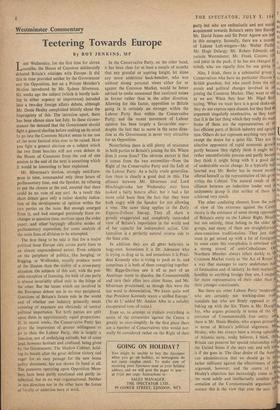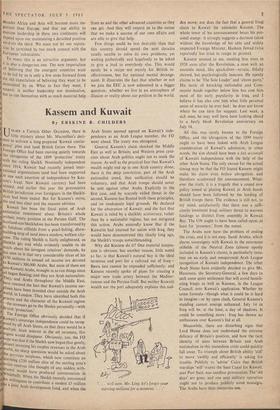Westminster Commentary
Teetering Towards Europe
By ROY JENKINS) MP LAST Wednesday, for the first time for eleven months, the House of Common deliberately debated Britain's relations with Europe. It did this in time provided neither by the Government nor the Opposition, but on a Private Member's Motion introduced by Mr. Sydney Silverman. Six weeks ago the subject (which is hardly lack- ing -in either urgency or importance) intruded into a two-day foreign affairs debate, although Mr. Denis Healey complained bitterly about the impropriety of this. The intrusion apart, there has been silence since last July. In these circum- stances the demand that the Government should fight a general election before making up its mind to go into the Common Market seems to me one of the most farcical cries ever to be raised. How you light a general election on a subject which the two front benches will not even debate in the House of Commons from the end of one session to the end of the next is something which it would be interesting to hear explained.
Mr. Silverman's motion, strongly anti-Euro- pean in tone, commanded only three hours of parliamentary time, and the Speaker, by refusing to put the closure at the end, ensured that there could be no vote of any sort. As a result this short debate gave only a rather sketchy indica- tion of the development of opinion within the two parties on the issue. But enough emerged from it, and had emerged previously from ex- changes at question time, motions upon the order paper, and other varyingly effective modes of parliamentary expression, for some analysis of the main lines of division to be attempted.
The first thing to be said is that for a major political issue Europe cuts across party lines to an almost unprecedented extent. Even subjects on the periphery of politics, like hanging, or flogging, or Wolfenden, usually produce more of the illusion than the reality of a cross-party situation. On subjects of this sort, with the pos- sible exception of licensing, the bulk of one party is almost invariably allied only to the fringe of the other. But the issues which are involved in the European debate are in no way peripheral. Questions of Britain's future role in the world and of whether our industry primarily needs cosseting or exposure are obviously of central political importance. Yet both parties are split upon them in approximately equal proportions. If, in recent weeks, the Conservative Party tas given the impression of greater willingness to go in than the Labour Party, this is largely a function, not of underlying attitude, but of some lead, however hesitant and confused, being given by the Government. The Shadow Cabinet, hold- ing its breath after the great defence victory. and eager for an easy passage for the new home policy document, has not shown its hand at all. The pressures operating upon Opposition Mem- bers have been partly emotional and partly in- tellectual, but in no way organisational. Neither in one direction nor in the other have the forces of loyalty or ambition been at work. In the Conservative Party, on the other hand, it has been clear for at least a couple of months that any grateful or aspiring knight, let alone any more ambitious back-bencher, who was without strong personal views either for or against the Common Market, would be better advised to make occasional (but cautious) noises in favour rather than in the other direction. Allowing for this factor, opposition to Britain going in is certainly no stronger within the Labour Party than within the Conservative Party; and the recent movement of Labour opinion has been largely a favourable one— despite the fact that to move in the same direc- tion as the Government is never very attractive for an Opposition.
Nevertheless there is still plenty of resistance in both parties to Britain's joining the Six. Where does it come from? The obvious answer is that it comes from the two extremities—from the Right of the Conservative Party and the Left of the Labour Party. As a fairly crude generalisa- tion there is clearly a good deal in this. The alliance between Mr. Silverman and Lord Hinchingbrooke last Wednesday may have looked a fairly bizarre affair, but it had a far more solid basis than the fact that they were both angry with the Speaker for not allowing a vote. The same thing applies to the Daily Express-Tribune line-up. They all share a grossly exaggerated and completely outmoded view of Britain's importance in the world and of her capacity for independent action. Uni- lateralism is a perfectly natural reverse side to the Suez coin.
In addition they are all great believers in bogy-men. Sometimes it is Dr. Adenauer who is trying to drag us in, and sometimes it is Presi- dent Kennedy who is trying to push us in, and sometimes it is both of them conspiring together. Mr. Biggs-Davison saw it all as part of an American move to dissolve the Commonwealth and turn their allies into client States, and Mr. Silverman proclaimed, as though this were the last word in denunciation, 'We know quite well that President Kennedy wants a unified Europe.' (`So do I,' added Mr. Austen Albu in a suitably exasperated tone of voice.) Even so, to attempt to explain everything in terms of the extremities against the Centre is greatly to over-simplify. In the first place there are a number of Conservatives who would nor- mally be considered rather on the Right of their party but who are enthusiastic and not mere') acquiescent towards Britain's entry into EuroPt Mr. David James and Sir Peter Agnew are boll in this category. Secondly, there are a numbe of Labour Left-wingers—Mr. Walter Padlel Mr. Hugh Delargy, Mr. Robert Edwards an outside Westminster, Mr. Frank Cousins (t real joker in the pack, if he has not changed mind), who are equally firm for our going Also, I think, there is a substantial group Conservatives who have no particular illthion British grandeur, but who recoil from the ec nomic and political changes involved in 0 su joining the Common Market. They want to sts bi as we are. When they hear Mr. Nigel Bird saying, 'What we want here is a good shake-up they do not express open dissent, but they find thi argument singularly unattractive, as they knov that it is the last thing which they really do waric Some of them are the representatives of thi less efficient parts of British industry and agricul lure. Others do not represent anything very mudt except the desire for a quiet life. They are la su stinctive opponents of rapid economic growth gc partly because they rightly think it might be I I ( rather uncomfortable process and partly becausiLii they think it might bring with it a good des NA of undesirable social change. In a typically half sil hearted way Mr. Butler has in recent monthl [la offered himself as the representative of this gro in within the Cabinet. The natural result of t alliance between an indecisive leader and undynamic group is that neither of them h 8/ achieved very much. dc The other confusing element from the poin th of view of 'the extremes against the Centre theory is the existence of some strong opponenti n'' of Britain's entry on the Labour Right. MosilY but not entirely, these belong to the older ag4 groups, and many of them are straightforward class-conscious traditionalists. They just don' )1 want to get mixed up with a lot of foreignerqt: In some cases this xenophobia is entwined wilt a strong strand of anti-Catholicism. 001111' Northern Member always refers darkly to 111`1"; Common Market treaty as 'the Act of Rome' it a way that manages to carry undertones boti of fornication and of idolatry. In their instinc0 01 hostility to anything foreign they are, I suspeclii far more representative of their older than 01 k their younger constituents. . pl But there are other Labour Party `moderats4vv, who are certainly not working-class trarlt pr tionalists but who are firmly opposed to 001- linking up with the Six. There is Mr. Doug11311-1, Jay, who argues primarily in terms of the inl portance of Commonwealth free entry; an' 1: there is Mr. Denis Healey, who argues primaril) iii in terms of Britain's political alignment. M' in Healey, who has always been a strong upholdelst of Atlantic unity, really believes, I think, dial 11( Britain can preserve her special relationship will O1 the United States if she stays out, and will it if she goes in. The clear desire of the Amert th can administration that we should go in 14"1 rather militated against the effectiveness of thl! el argument, however, and the centre of NI"' Healey's objection has increasingly come to 1:14 Vs. the most subtle and intellectually credible pre' hi sentation of the Commonwealth argument. ill k essence this is the view that over the next fe'' decades Africa and Asia will become more im- portant than Europe, and that our ability to exercise leadership in these two continents will (10Pend upon our maintaining a detached position vis-a-vis the third. We must not let our reputa- ti)n be tarnished by too much contact with the European 'colonialists.'
To many this is an attractive argument, but it is also a dangerous one. The new imperialism of believing that the emergent countries want to be led by us is only a few steps forward from the old imperialism of believing they want to be
.1 •
ominated by us. What in fact they want, I suspect, is neither leadership nor domination, but to run themselves with as much material help from us and the other advanced countries as they can get. And they will respect us to the extent that we make a success of our own affairs and are able to give that help.
Few things could be less desirable than that this country should spend . the next decades totally unable to solve its own problems, yet waiting pathetically and hopelessly to be asked to give a lead to everybody else. This would surely be a recipe not merely for British in- effectiveness, but for national mental derange- ment. It illustrates the fact that whether or not we join the EEC is now subsumed in a bigger question: whether we live in an atmosphere of illusion or reality about our position in the world.



























































 Previous page
Previous page